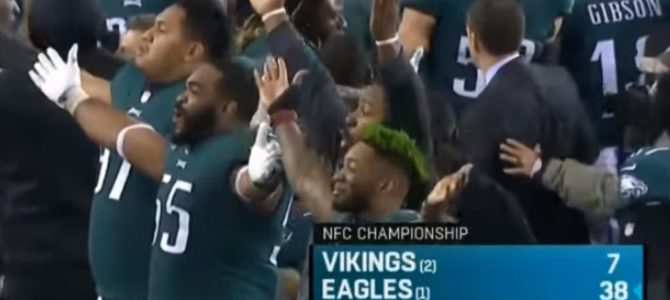
On Sunday, while pundits inside the Beltway (and federal employees) remained focused on the ongoing government slowdown, millions of Americans focused on the sporting world, as the National Football League’s conference championships set the lineup for Super Bowl LII: The AFC Champion New England Patriots against the NFC Champion Philadelphia Eagles.
Going into Sunday’s matchups, many football observers expected one close game and one blowout. They got what they expected, but not in the order they expected. In the afternoon game, New England—a prohibitive favorite against the Jacksonville Jaguars—needed all it could muster to defeat the pesky Jags and reach its record tenth Super Bowl. The Patriots overcame a double-digit deficit to win, 20-17.
The Patriots’ Come-From-Behind Win
In its come-from-behind win—Jacksonville led for most of the game—New England quarterback Tom Brady echoed, well, Tom Brady. Deprived of his biggest receiver, tight end Rob Gronkowski, due to a concussion at the end of the first half, Brady still found a way to lead his team to the win.
After an inadvertent whistle prevented Jacksonville from the chance to score what could have been a game-clinching touchdown on a fumble return, Brady connected with wide receiver Danny Amendola for 21 yards on a critical third-and-18 play. That drive resulted in a touchdown to Amendola, and another touchdown throw from Brady to Amendola gave the Patriots their margin of victory.
For Brady, it’s his record eighth trip to the Super Bowl, and his record eleventh fourth-quarter comeback in the postseason. He and Coach Bill Belichick seek a repeat title, after last year’s record-breaking comeback from a 28-3 deficit to defeat the Atlanta Falcons in Super Bowl LI. For both quarterback and coach, a win would represent their second time winning three titles in four years in their respective careers.
Eagles Go for Broke Against Minnesota
As for the Eagles, they spotted the Minnesota Vikings a seven-point lead, then roared back with 38 unanswered points to roll to a 38-7 home win in the NFC championship. The defense led the way, with cornerback Patrick Robinson returning an interception for a touchdown, sparked by pressure from Chris Long on Viking quarterback Case Keenum.
The pick-six started the Philadelphia scoring, brought the home crowd to its feet, and changed the game’s complexion. With 3:16 before halftime, the Eagle defense caused another turnover, just as Minnesota seemed poised to score. Instead of the Vikings cutting into a 14-7 Philadelphia lead, the Eagles took the ball, receiver Alshon Jeffery hauled in a deep pass, and the Eagles suddenly led by two touchdowns.
Whereas Jacksonville played conservatively against New England, Philadelphia went for broke against Minnesota’s vaunted defense. The Jaguars sat on a slim four-point lead right before halftime, while the Eagles, even after Jeffrey’s long touchdown with 1:09 left in the half, scored another three points right before intermission, to go up by three scores.
Philadelphia quarterback Nick Foles shone, throwing for 352 yards and helping the Eagles with a series of big plays, including a flea-flicker in the third quarter. When starting quarterback Carson Wentz—who gave an MVP-caliber performance all season—went down for the season with a knee injury in a game against Los Angeles last month, the sports world questioned the Eagles’ chances. But Foles came up big on Sunday, earning Philadelphia a trip to the Super Bowl.
Foles, who started during his first stint with the Eagles in 2013-14, looks to win the Super Bowl as a backup, just as Jeff Hostetler did for the New York Giants in Super Bowl XXV. (The Giants’ defensive coordinator that year: Bill Belichick.)
New England Forces Opponents to Beat Themselves
The Patriots-Eagles matchup provides a rematch of Super Bowl XXXIX, won by New England 24-21. In that game, Philadelphia mounted a late comeback, but poor clock management, coupled with a famous rumored vomiting episode by quarterback Donovan McNabb, prevented the Eagles from achieving their first Super Bowl title.
The episode speaks volumes in the way in which the Patriots have won their championships: by executing flawlessly, and by forcing other teams into mistakes. From the goal-line interception thrown by Seattle quarterback Russell Wilson three years ago, to the poor clock management the Atlanta Falcons demonstrated while surrendering a 28-3 lead in the Super Bowl last year, New England forces its opponents to beat them—and most often those opponents beat themselves.
New England has won its five Super Bowl titles by a combined 19 points. Its largest margin of victory, six points, came last year—and that game went into overtime. (Fun fact: Thanks to the Chicago Bears’ blowout of the Patriots in Super Bowl XX, New England holds a 5-4 record in Super Bowls, yet has been outscored 238-200 over those nine contests.) The Patriots will not wither under the spotlight, and opponents know it, which gives New England a psychological edge tough to overcome.
On the other hand, Philadelphia has thus far not folded either, despite the loss of its starting quarterback—not to mention its placekicker, running back, and an All-Pro offensive lineman. Despite having the NFC’s best record, and home-field advantage, oddsmakers made them underdogs in both their playoff games to date, a role the Eagles and their fans have come to relish. Las Vegas already counts the Eagles a 5.5-point underdog to the defending champion Patriots. (Apparently the oddsmakers ignored the Patriots’ history of winning Super Bowls, but winning them close.)
Will Brady win his sixth Super Bowl title, extending his NFL record? Can backup Foles lead the Eagles to their first NFL title since 1960? How will the Patriots’ vaunted offense match up against the smothering Philadelphia defense? On February 4 in Minneapolis, millions of Americans will find out.
Mr. Jacobs is founder and CEO of Juniper Research Group, a policy consulting firm. He is on Twitter: @chrisjacobsHC.









